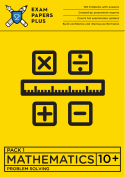
11 Plus Verbal Reasoning Exam Preparation
Bookmark this page? Pop your email into the box below to receive a link to this article so you can easily refer back to it later.
Table of Contents
Introduction
The verbal reasoning part of the 11+ exam can be one of the trickiest to prepare for. The test can vary depending on the examination board. For example, Moray House and Granada Learning (GL) Verbal Reasoning Tests are structured differently to those created by Centre for Evaluation and Monitoring (CEM).
It’s important that you find out in advance which body will be administering your child’s test, so that you can help them adequately prepare beforehand. The type of verbal reasoning test that your child will sit will of course have an impact on how they prepare.
To help your child prepare for the 11 Plus verbal reasoning exam, we’ve put together this guide, to ensure that you have all bases covered.
Helping Your Child Increase Their Vocabulary
Focusing on building your child’s vocabulary not only helps them with the English questions in the exam, but it ensures that they understand each question being asked, whether it be an 11 Plus Maths, or English-focused question.
Many parents make the mistake of focusing only on practice exam papers to enhance verbal reasoning skills. Although practice papers are undoubtedly important, starting with the basics can really help give your child an added advantage.
A good starting point is to make sure that your child is confident with the Key Stage 2 English course, as the verbal reasoning exam makes use of many of the skills your child will cover throughout the programme.
Once your child has a good grasp of the KS2 English requirements, you can help enhance their vocabulary by other means, such as encouraging them to read more challenging books for their age group, giving them spelling tests, playing word games and engaging them in conversations that encourage them to stretch their vocab.
Creating word lists can be a particularly useful exercise in getting your child used to seeing unfamiliar words. They can also help your child make better educated guesses on words that they’re unsure about. Using an 11 Plus vocab book, write down any words that your child doesn’t know and add it to their word list. Through time, the list will grow and every week your child will have a new set of words to learn as well as existing words to revise.
There are various different types of words that come up in the verbal reasoning test and it can really give your child the edge if they’re somewhat familiar with the type of word that’s being looked at. Typical word types include:
- Antonyms: words with opposite meanings, e.g. good and bad.
- Compound words: a combination of words that have a single meaning, e.g. flowerpot.
- Homonyms: words that sound the same but a different meaning, e.g. allowed and aloud.
- Word groups: words that can be grouped together under a theme, e.g. sports.
- Synonyms: words that have similar meanings, e.g. walk and stroll.
Improving Numeracy and Mental Arithmetic
This is the ‘Maths’ or ‘quantitative’ aspect of the verbal reasoning test and is one of the easier parts to prepare for. These types of questions are more common in GL administered tests. Working on improving your child’s numeracy skills and mental arithmetic abilities can really enhance their overall performance in the test.
Generally speaking, children usually find the numeracy questions the easiest type of questions in the exam, as they will already have prior experience of them through their Key Stage 2 class work. If your child can master the numeracy and mental arithmetic section of the test, they can spend more time on the more challenging parts of the exam.
As always, it’s good to start with the basics, so you may want to ensure that your child knows their times tables. Test them by asking them multiplication questions verbally and having them answer without using a pen and paper or calculator. You should also test them on their division, which pupils then to find trickier than multiplication. Take note of any particular types of sums that your child struggles with and be sure to spend ample time working on them to improve your child’s ability.
Focusing on Enhancing Memory
If your child can retain information in their head without taking notes, they’ll have a good advantage on the day of the exam. There are lots of ways you can help improve your child’s memory, including asking them to recite their word lists and simply by asking them mental arithmetic questions.
There are also various different games that can help enhance their memory and improve their processing speed.
Being able to hold data in the short term memory while using it to solve a problem is an essential skills for the 11 Plus verbal reasoning test and it’ll also come in handy for many other aspects of studying and revision. Because speed plays an important part in the test, enhancing your child’s memory will enable them to complete questions quicker and therefore get through more on the day of the test, consequently improving their chances of a good score.
11 Plus Verbal Reasoning Practice Exam Papers
Earlier in the post, we said that focusing on verbal reasoning exam papers alone aren’t enough to ensure that your child will do well on the day of the test, and this is true. However, neglecting to use exam papers altogether puts your child at a great disadvantage.
Not only to practice papers help familiarise your child with the layout of the verbal reasoning exam, but they help them get used to the types of questions that could be asked. At Exam Papers Plus, we have a range of 11 Plus verbal reasoning exam papers that you can download directly from the site. Each test paper comes complete with answers and explanations, so they can be used over and over again to help your child master their verbal reasoning skills.
Verbal Reasoning: Full Practice Tests
Verbal Reasoning: Skill specific practice
11+ Verbal Reasoning: Anagrams
11+ Verbal Reasoning: Analogies
11+ Verbal Reasoning: Compound Words
11+ Verbal Reasoning: Embedded Words
11+ Verbal Reasoning: Form a Word
11+ Verbal Reasoning: Insert a Letter
11+ Verbal Reasoning: Letter Analogies
11+ Verbal Reasoning: Letter Calculations
11+ Verbal Reasoning: Letter Codes
11+ Verbal Reasoning: Letter Sequences
11+ Verbal Reasoning: Move a Letter
11+ Verbal Reasoning: Number Analogies
11+ Verbal Reasoning: Number Calculations
11+ Verbal Reasoning: Number Sequences
11+ Verbal Reasoning: Rhyming Synonyms
11+ Verbal Reasoning: Shuffled Sentences
11+ Verbal Reasoning: Synonyms
11+ Verbal Reasoning: Word Completion
11+ Verbal Reasoning: Word Match
11+ Verbal Reasoning: Word Opposites
11+ Verbal Reasoning: Word Pairs
11+ Verbal Reasoning: Word Puzzles
11+ Verbal Reasoning: Word Relationships
As the big day approaches, we recommend that your child focuses on doing timed practice papers to improve their time management skills. The quicker they’re able to answer each question, the more questions they’ll be able to answer overall.
Related post:
11 Plus Non-Verbal Reasoning Advice
Bookmark this page? Pop your email into the box below to receive a link to this article so you can easily refer back to it later.
















